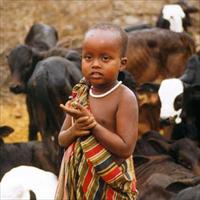COTE D'IVOIRE: Tend to cattle then go to class

Shortly before noon 7-year-old Kolotioloma Soro, her 9-year-old sister Anne-Marie and a crowd of other children tie up their cattle to bushes and sit under a giant tree for a brief rest before their school lessons.
After a meal of millet cakes and milk, the children retrieve slates and chalk they keep tucked away in nearby underbrush then situate themselves in straight rows on the ground under the tree. “The teacher will be here shortly,” Kolotioloma says. “We’ll review a bit before he arrives.”
The children – in Fapaha village in Côte d’Ivoire’s north-central Korhogo region – are part of a programme, sponsored by the UN Children’s Fund (UNICEF) and run by the local NGO ‘Animation Rurale de Korhogo’ (ARK), to provide schooling to children who spend their days tending to family crops or livestock.
UNICEF is working to expand the programme to other regions of the country, the organisation’s Côte d’Ivoire Representative Youssouf Oomar told IRIN on 4 December. “It’s proven, based on our experience in Korhogo, that there is a way to get these children into a schooling system.” He said UNICEF is appealing for more funds to support the initiative.
The head of ARK said children must be given a chance at an education. “These children have everything it takes to learn to read and write just as their friends in regular school do,” ARK’s Benoit Soro told IRIN.
ARK’s nearly 80 volunteer instructors lead classes under trees or in village huts from noon to 2pm, when the children have a break from their field work. UNICEF provides supplies and teacher training.
Some parents ambivalent
In Cote d’Ivoire – where more than five years of conflict has severely disrupted basic education and other public institutions – the literacy rate is slightly over 50 percent, according to UNICEF. In the north the literacy rate is about half that, according to an Education Ministry statistics office.
And all across the region, poverty in some areas is such that parents cannot afford to send a child to school – the expense of supplies and the loss of a worker.
“I have no one [but my children] to help me with work in the fields,” Dramane Tuo, father of four children who tend to crops and livestock, told IRIN. “When it’s time for planting everyone is busy. One can’t count on anybody but one’s own children.”
At the same time, Tuo said he knows his children need an education. “We know children need to go to school.” His children are participating in the special classes.
Other parents in Korhogo are not convinced. Katiénézongui Soro has not decided whether to allow his children to attend, saying he would lose workers and his children would get distracted. “Not only is my workforce reduced, but when the children come back from class it’s tough for them to get back into the rhythm of farm work.”
Agricultural calendar
The organisation ARK works to adapt to the agricultural calendar to optimise schooling. ARK says it is clear that when farm work is most intense, children are less likely to show up consistently for classes.
In January – when the children will resume classes – field work is minimal. “We are going to step up the schoolwork during that time,” ARK’s Soro said. He added that once field work increases, parents “will not hesitate to come and fetch their children.”
Thirteen-year-old Karim Yéo’s parents might come looking for him some days, but he is enjoying his daily two hours of schoolwork. “I would like to have gone to [regular] school,” said Yéo, his torn clothes serving as both work garb and school uniform. “But my parents didn’t register me. I help them all the time with work in the fields before coming here for these classes under the tree.”
Back under the tree, the children sit in rows, silent, as their teacher arrives on a motorbike to begin the day’s lesson. They stand and greet him formally as any group of students seated at desks in a normal classroom would. “OK,” the teacher says to intensely attentive faces. “We’re going to review a bit then start on some maths.”
After class the children put pens, pencils, slates and books in shoulder sacks and go retrieve their cattle.
 Back and Next - Back and Next
Back and Next - Back and Next See Also - See Also
See Also - See Also